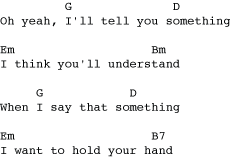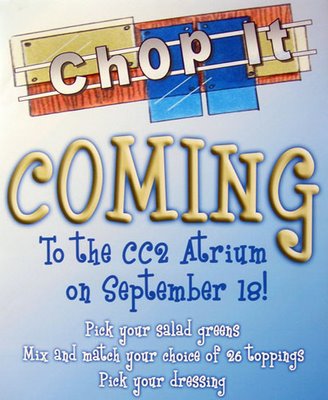
All right. So I
bit off quite the mouthful a couple days ago, promising to explore and possibly elucidate what made the Beatles' music so exciting, and what set them universes ahead of their contemporaries.
Others have spent eons wallowing around in the Beatles' canon microscopically examining each individual twang and paradiddle, and at least three
very good books have been
written on the topic by classically trained musicians -- my favorite being Ian MacDonald's
Revolution in the Head, an impressively (some would say excessively) ambitious work that both examines the Beatles' output song-by-song and tries to explain their significance in contemporary events.
A single blog post probably isn't going to have
quite that kind of range.
I began this little exercise by falling rather hard for a quite charming mid-Sixties song by the Swedish group The Mascots on the Nuggets II collection,
"Words Enough to Tell You," (original version this time, not my po-faced GarageBand attempt at it -- pops). My impression was that it was fairly plainly attempting to conjure the BeatleMagic, but falling just short of its goal. The idea struck me that if I could identify
how the song failed, I might be able to illustrate what, to my mind, made the Beatles so great.
Commenters on the earlier post had some interesting contributions. Steve and Kevin, in particular, reined me in a bit on the whole idea of Beatle-ishness, reminding me that the Beatle-aciousness of 1967 was a thing on an entirely different plane than that of, say, 1964. (The secret ingredient being, of course, the different kind of dope they were taking. The '64 Fabs were fueled on a speed-and-Scotch diet, not yet having discovered the gentling and horizon-expanding effects of the Kind Bud.)
In contrast to the opinions of most people I've talked to on the subject, I've always argued that the earlier Beatles' innovations, on a purely musical plane, were even more outrageous than their later ones. While no one will dispute that "Sergeant Pepper" had a gigantic effect on the musical forms of the time, ushering in the idea that rock music could be Art, I do argue that the stunningly revolutionary sophistication that the early Beatles brought to the previously simplistic vernacular of rock-and-roll managed to push a stagnant, gray music, stuck in the stultifying Tin Pan Alley conventions of the early Sixties, into a world of blazing, blinding color.
It's this quality of the Beatles that has always kept me coming back to 1964. If you weren't alive then, you can't begin to conceive how utterly, shockingly
new their music was. I can imagine thousands of young men sitting around scratchy little record players spinning "I Want to Hold Your Hand," fingering their newly acquired guitars, their bravely lengthening hair beginning to touch their eyebrows, furiously taking notes and thinking to themselves "Hell, this is
easy! Just play some R-n-B and wiggle your moptop during the hook!"
But it really wasn't that easy. And what made it hard -- what made the Beatles unique, in other words -- was the richness and sophistication that they infused into a form that everybody else thought was
easy.I've said before that the ultimate challenge to someone trying to arrange for two-guitars-bass-and-drums is to make it
interesting. That's a pretty limited palette in anybody's book. Rock-and-roll in its purest, pre-British Invasion American form offers a relatively small number of things that you can do to make it interesting and still stay within the genre. Think of something like "Heartbreak Hotel"; the excitement that song generates is purely from Elvis' shockingly feral performance of it, and not from any musical surprises it affords. A first-year guitar student should be able to figure out the chords in under a minute -- they're exactly the same chords that appear in thousands upon thousands of other songs in hundreds of vernaculars. Even Buddy Holly, another genius, rarely left the strictures of the form.
What the Beatles realized early on -- before they won their recording deal, certainly -- was that you could raid
other genres for ideas to make the two-guitars-bass-and-drums thing interesting. I put this discovery squarely into McCartney's lap; he was the Beatle whose appetite for
schmaltz led them to explore the notion of copping ideas from other contemporary styles of music -- from Hollywood, from Broadway, from the Roseland -- to drop into their own arrangements. "Besame Mucho." "Till There Was You." "A Taste of Honey." All songs championed by Paul.
I'm not going to contend that this is unique in musical history -- or even among the early Beatles' contemporaries. But what I will credit the Beatles with is the notion that things borrowed from other genres -- unusual chord choices, unusual voicings, unintuitive harmony singing -- could be translated into a simple arrangement for two-guitars-bass-and-drums and made to
rock. Really fuckin' hard. The early Beatles took simple music, imbued it with borrowed sophistication, and gave it glorious, revolutionary, world-shaking
drive.Let's get down to cases. Let's look quickly at the chords of the opening lines of "I Want to Hold Your Hand," and the same part of "Words Enough to Tell You." (I know, the comparison is deeply unfair, but you'll see where I'm going. The songs are in different keys, but I'll transpose them to the same key for ease of comprehension.)

Note that last chord....Now here's the corresponding opening lines of "Words Enough to Tell You":

Ah-
HA!!!! Do you see it?
Do you see it?Both songs, at extremely important moments in their development, choose a B7 chord -- a chord that isn't in the home key. Its use momentarily throws the identity of each song's key into a state of uncertainty:
Whoa! Where'd that chord come from? Where they hell are they going with this?(You may think that you, the layperson, don't think this.
I don't know any music theory! Where the hell does this overheated goober get off telling me what's in my head? But you do.
Oh, yes you do. Remember
"Going-forth-and-returning"? The introduction of that unexpected chord in both of these songs is exactly analogous to that moment when Our Hero meets a dragon, or falls into a well. This is emotionally affecting in exactly the same way -- it tickles the same nerve-ending -- as the introduction of conflict in narrative, when the path to a satisfactory ending, the Way Home, is suddenly blocked by an unexpected plot-twist. Just because we lack the vocabulary to
describe it doesn't mean it's not happening.)
You don't think the Beatles knew what they were doing? Think that B7 was just a lucky guess? In a footnote, Ian MacDonald tells us:
Lennon remembered this as the chord that 'made' the song. When McCartney found it -- to judge from the the movement of the melody line, he was sitting on the left, voicing the chord-sequence in descending inversions -- Lennon shouted 'That's it! Do that again!' (Sheff and Golson, p. 117.)
(And oh, hey --
not to beat a dead horse or anything, but once again we have an example of the skilled songcrafter's trick of making the moment of uncertainty happen
exactly on the key word in the lyric.)That B7 chord is so powerful -- and the Beatles
knew it was so powerful, such a godalmighty great hook -- that they wrung absolutely everything they could out of it. Paul's part jumps up a whole octave -- the quintessential wiggle-your-moptop moment. Listen to Ringo's drum fills on each of the five times that chord occurs -- he's just smacking the shit out of them. Other elements of the song -- the killer intro, recapitulated at the end of the two bridges ("I can't hide! I can't hide!"), the vocal octave upward leap on the chord-of-surprise, the alternating unison and harmony singing, George's double-stop country lead fills, the altered texture of the bridges, the syncopated, braking 3/8 ending, and above all, what MacDonald calls the "beatific energy with which the group belted it out" -- combine to create what I will insist to the end of my days is the most exciting two-and-a-half minutes in the history of rock and roll.
So wouldn't
you steal it?
The Mascots' song, as we've said, uses this same trick of introducing a major chord based on the mediant of the home key, with a reasonably successful result. It introduces a similar sudden sense of tonal uncertainty, which was its desired effect. But what's lacking, I think, is the sense of brashness, of confidence that the breaking of a "rule" is done for the sheer joyful hell of it. "I Want to Hold Your Hand" uses the emotional uncertainty implied by the chord as a trigger for joy and excitement; "Words Enough to Tell You" uses it as a mere device to get from the verse to the bridge. The Mascots
employ the "wrong" chord; the Beatles absolutely
rub your face in it.I'll freely admit that the comparison of the two songs is unfair. "Words Enough to Tell You" isn't
meant to be "I Want to Hold Your Hand"; it's a rather twee little midtempo harmony-soaked love song, and not the product of young geniuses commanded to produce their first hit for the American market, as the Beatles were tasked with. And there are, no doubt, thousands of other early- and mid-Sixties songs that employ those same chords -- so much so that it has become a characteristic progression, a cliche you might trot out if you wanted to write a parody, or a commercial work-song, that evoked that time.
This was the Beatles' greatness: Their accidental discoveries, their "mistakes," their "That's
it! Do that again!"s -- became clichés.
Stuff I Left Out But Didn't Want To- Allan Ginsberg, hearing "I Want to Hold Your Hand" for the first time, leaped out of his chair and danced. He had never danced in public before.
- Bob Dylan was absolutely floored by the song. He was later quoted. "They were doing things nobody was doing. Their chords were outrageous [major chord based on the mediant of the home key, you mean, Bob?], just outrageous, and their harmonies made it all valid."
- The Fabs' German-language version of the song, "Komm, Gib Mir Diene Hand," recorded in Paris in January of 1964, rocked way fuckin' harder than the original.












